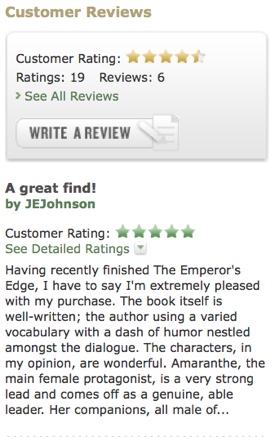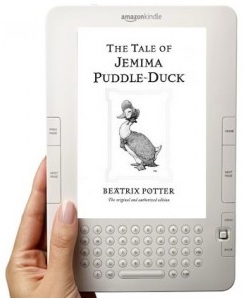While I was wondering what to blog about today, someone (thanks, Kevin Tross!) sent me an email asking how well I’m doing with my ebooks and if there’s hope for normal authors (not the Amanda Hockings, JA Konraths, Brian S Pratts, and other folks who, some feel, are doing so well in part because they got in early and/or brought a big back-list of books to the table so they could dump 17 ebooks into the marketplace from the get-go). What if you’re coming into the game now, when there’s a lot more competition than there was even a year ago, and what if you’re publishing your first novel or two?
I guess I’ll put myself out there as a “normal” author (which is funny since I’m a big geek and people don’t call me normal very often!) and talk about how I’m doing so far.
My results may even be sub-normal, since I write cross-genre stories (a little urban fantasy, a little science fiction, a little steampunk, a little high fantasy, a little romance…you get the picture), which aren’t the easiest things to categorize and promote. Even with straight-up science fiction or high fantasy, you’re not looking at popular genres. I also don’t know squat about art, so getting cover art done that people actually find appealing has been an ongoing challenge.
Before I ‘fess up my sales numbers (I’m nowhere close to making a living at this), let me point out that I published my first ebook in December 2010–a year from now, I’ll have more books out, and higher numbers, I hope!
I’ll also point out that, back in 2004, it took me six months before I started making any money (and that was less than $200) with my websites and blogs (my day job for the last six years). So, I come into e-publishing with the perspective of this being a long-term game and not something you get into if you’re hoping to make a living overnight. My sales numbers have consistently grown each month since I started, and I can tell already April will be better than March. I’m grateful to the folks who have purchased my work thus far, and I hope many more will find me in the future!
Okay, enough hemming and hawing. Here are the numbers:
My sales numbers for March, 2011
Amazon: ~ $390 (they haven’t come out with the March report yet, so this is an estimate–they show $600 for the last six weeks)
Barnes & Noble: $254
Smashwords & Partners: $80 (also an estimate, since they report quarterly, and I’m too lazy to go add up individual sales for March).
Total: $724
Hey, it’s better than a paper route! 😀
Hope for the mid-list ebook author
While my numbers aren’t going to blow anyone out of the water, I can see the potential for growth, and I think it’s heartening to know you can make some money as a “mid-list” ebook author (I’m not on any bestsellers lists anywhere, and I haven’t dropped the price of my novels to $0.99 to see if I can sell piles of them at a next-to-no-barrier-to-entry point).
On the Kindleboards and on a few author blogs, I see people doing better than me, so you may very well out-perform me. I’m a little lazy when it comes to marketing (I do some things regularly, such as guest posting and blogging here, but I’m honestly not very social online, so I’m not out there networking with the important people, racking up a thousand posts on the big e-publishing forums, or schmoozing everyone with a Goodreads account).
A final point on “making a living” as an indie ebook author
The initial question that spurred this post was, “Can you make a living at this?” One of the tough things about answering that question is that everyone has a different notion of how much money it takes to make a living. Where you live, how many incomes contribute to your household, and your lifestyle all factor into what you consider a decent income.
I remember someone claiming to make a living writing articles for eHow once, and I later saw she was making $800 a month. Hey, great for her, but in the Seattle area, you’d be lucky if that covered half a house payment. In New York, that’s probably what it costs to take the family out to eat.
That said, sure, I can see the potential for normal authors to make a living via e-publishing. The biggest thing you can probably do for yourself is get a lot of work out there. More ebooks mean more chances for people to find you, and once you turn someone into a fan, they’ll go on to buy more of your work.
Final notes:
If you are eager to make more, sooner, non-fiction is historically more profitable. If you can teach someone how to solve a problem, you can make a lot. If that’s something you’d be interested in, check out “Kate Harper on Making Money Publishing Kindle Articles”
I make a little extra from this blog (and my Kindle Geeks one) by sticking in affiliate links to ebooks when appropriate (including my own!). For more information on that, check out my series on How to Make Money as a Book Blogger.
Update (Sept. 7th, 2011): I made $3,000 in August. I had three novels, two novellas, and some short stories out at that point. I’m looking forward to seeing what happens with the next release, later this fall!


 It’s no secret that reviews play a big role in helping people decide whether or not they should buy a book. It’s a form of
It’s no secret that reviews play a big role in helping people decide whether or not they should buy a book. It’s a form of 
 Since my first ebook was a collection of
Since my first ebook was a collection of 
 I’ve
I’ve 

